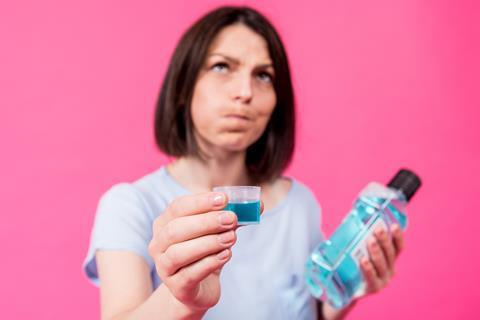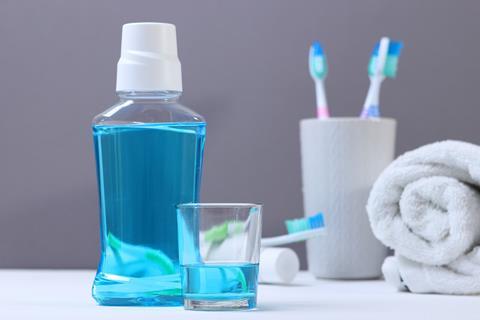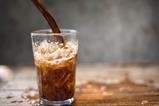What chemicals are in mouthwash and is the time you use it important?

Dental hygiene is a key part of any daily regimen. We use lots of products to keep our teeth as healthy, white and gleaming as possible, from toothpaste and floss to mouthwash. But is mouthwash all it’s cracked up to be?
First, here’s a caveat: the best evidence shows mouthwash isn’t associated with cancer. This link was suggested because most mouthwashes contain alcohols, including ethanol (C2H6O), which is known to increase cancer risk as it can damage cells. Given these concerns, scientists studied potential links between oral cancer and mouthwashes extensively in a meta-analysis, by essentially combining all of the studies together to see if there was a pattern. The current consensus is that there’s no evidence of a link.
We need to stick with alcohol, though, because it plays several roles in traditional mouthwashes (there are non-alcohol mouthwashes, that contain cetylpyridinium chloride or chlorhexidine gluconate, too). One of mouthwashes’ most noticeable outcomes is a minty fresh breath. Alcohol dissolves the essential oils, such as menthol, thymol and eucalyptol – from mint, thyme and eucalyptus plants – which then evaporate in your mouth, giving you that ‘clean’ feeling and taste.
The mouth is a natural ecosystem and problems arise when the delicate balance gets disrupted
Alcohol’s second role in mouthwash is arguably more important. Alcohol is an antiseptic, which means it can eradicate bacteria in your mouth. It does so by focusing on the bacteria’s proteins, which are essential in maintaining their cell walls. The different types of alcohol – which include isopropanol and n-propanol – compete with the bacteria’s own amino acids to form side chains, which disrupt the hydrogen bonding essential for maintaining the proteins’ tertiary structures (3D shape). Without these proteins, the bacteria lose their protective coatings and die.
This sounds great – who doesn’t want to wipe out bacteria? This is particularly important for people with halitosis (bad breath) which is usually caused by bacterial overgrowth in the mouth. When the bacteria interact with amino acids in foods, they can release volatile sulfur-based compounds, such as hydrogen sulfide – which smells like rotten eggs – or methyl mercaptan – which smells like a barnyard!
Teething problems
However, there is a catch. Your body is colonised by around 39 trillion microbes – easily outnumbering the 30 trillion cells that make up you. These bacteria often coexist in a mutually beneficial, or symbiotic, relationship. Perhaps unsurprisingly, given it’s where all those lovely sugars enter, your mouth is home to a vast selection of bacteria, including streptococcus and fusobacterium. The mouth is a natural ecosystem and problems arise when the delicate balance gets disrupted and bacterial growth gets out of control – resulting in tooth decay or gum disease.

Unfortunately, there is an issue with mouthwash: it doesn’t discriminate what kind of bacteria it kills. So, while the occasional rinse can be useful to keep bacterial growth in check, overuse can disrupt the healthy, natural state of your mouth.
The other problem with mouthwash is when most people decide to use it. One of the main advantages of using toothpaste is that it contains fluoride, the anion of fluorine. The acidic saliva in your mouth causes constant damage to your teeth, and reactive fluoride uses this opportunity to bond with your tooth enamel, which strengthens it and protects your smile. Unfortunately, the levels of fluoride in mouthwash tend to be lower than in toothpaste and some mouthwashes contain none, so the use of mouthwash immediately after brushing can wash away some of the fluoride provided from the toothpaste. For this reason, it’s best to use mouthwash when your saliva acid levels are high, such as after a meal, rather than immediately after brushing your teeth.
Overall, dentists still recommend using mouthwash because its advantages outweigh its problems. It’s just best to use it at the right time, and in the right amount.
Put this in context
Find out how research assistant, Lewis contributes to cutting-edge scientific research using specialist equipment to potentially diagnose diseases more quickly.
Kit Chapman














No comments yet